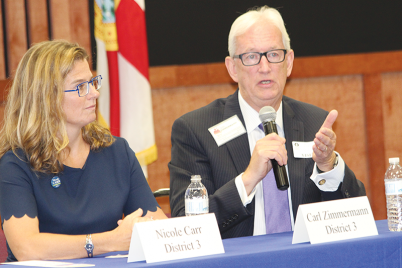Dr. Nicole Carr, Pinellas County School Board Member
By Goliath J. Davis, III, Ph.D., Contributor
PINELLAS COUNTY — On June 11, President Maria Scruggs and the NAACP hosted a virtual community discussion entitled the “Hidden Faces of Racism” with one 120 participants. Presenters from law enforcement, education, healthcare, and criminal justice addressed institutional, systemic policies and practices that result in disparate treatment and discrimination.
All of the presenters did an excellent job, and given the nexus between education and criminal justice, I want to highlight Dr. Nicole Carr, Pinellas County School Board Member.
Carr made it very clear her observations and conclusions regarding the education of black and brown children in Pinellas are based on many years of work within the district and her position as a school board member. She emphasized that she was not speaking for the other elected board members and the remarks she would make reflect her views and perspectives.
Her candor was refreshing and surprising. She spoke with compassion, shedding the political safeguards elected officials usually wrap themselves in. Carr delineated what she perceived as district strengths and noted areas where improvements are needed.
I, and perhaps others, was amazed when she stated district policies are not “anti-racist,” and if meaningful progress is to be made, we must change the hearts of some leaders. I concur with her assessment with one caveat: We may not be capable of changing anyone’s heart, but with proper oversight, we can change their behavior.
The lack of urgency by district leaders is another area board member Carr indicated needed to improve. She spoke about the metaphor used to describe change in the district and recalled being told turning a ship is a slow and deliberate process. As a consequence, needed changes and improvements are also slow. The incremental progress the district touts is frustrating to me and others as well.
Carr cautioned that some improvements are not what they appear to be when subjected to closer scrutiny. She cited an example I have written about — the black graduation rate.
She confirmed an obvious truth. While the graduation rate for black scholars has increased, the improvement is a result of concordance. Blacks who receive concordance diplomas are not proficient in math and reading. Board member Carr stated concordance diplomas might pose problems for graduates seeking employment and college entrance.
While black and brown children may become academic failures by dropout and concordance, Carr identified another area of failure where implicit bias may influence how the district responds to students of color. She noted blacks are suspended and arrested at rates exceeding their representation in the school district’s population.
Enrollment in advanced courses, genuine collaboration, improved elementary reading scores, and commitment to equity are areas Carr listed as district improvements. Each school in the district has an assigned Equity Champion. African American enrollment in advanced courses has increased, third and fifth-grade reading scores at Ponce de Leon and Campbell Park Elementary Schools are on the rise, and the adoption of “genuine collaboration” has enhanced community partnerships.
When one does as Carr directed, look below the surface, several of the aforementioned improvements prompt further questions. For example, how are the African-American scholars performing in advance placement courses and to what extent are they successful on Advanced Placement Examinations?
Additionally, Dr. Michael Grego chose to disregard “genuine collaboration” when he unilaterally failed to inform collaborators (COQEB, NAACP, community) of Director Nikita J. Reed’s (African American) departure or his selection of her replacement, a white female.
I reminded Carr that the best equity champion the district had, Director Reed, was allowed to leave, and collaborative partners were disrespected. Additionally, Ponce de Leon and Campbell Park Elementary Schools were under Reed’s umbrella. She expressed regret.
I commend Carr for being forthright, candid and honest in her presentation. Her performance is noteworthy for the reasons previously discussed and for another critically important reason — the board member we elected to represent us has to my knowledge, never acknowledged to the African- American community, the shortcomings with district policies and practices.
She never demonstrated the transparency exhibited by Carr regarding black graduation rates, the racial disparities in discipline and arrests, or the problems inherent in concordance diplomas, e.g., low math and reading proficiency.
I assume board member Carr may receive a less than favorable reception for her honesty and candor. She may feel alone and, as a result, hesitant to speak openly again and address hidden institutionalized discriminatory policies and practices.
Dr. Carr, I wish you had supported Ms. Reed from the dais and in committee meetings. Doing so may have positively impacted the sense of urgency you desire and sustained momentum. With her departure, we are back to fits and starts. A new director with a new approach will necessarily require a readjustment by educational leaders and, ultimately, lost momentum.

Goliath J. Davis, III. Ph.D.
I implore you, Dr. Carr, to continue to perform as you did during the community discussion. Please continue to identify problems, reform troublesome policies and practices, conduct appropriate analysis, insist on equity; close the achievement gap utilizing curricula and professional development training that’s culturally relevant, exercise appropriate oversight, and remember, the superintendent reports to the board, not vice versa.
Goliath J. Davis, III, Ph.D.












